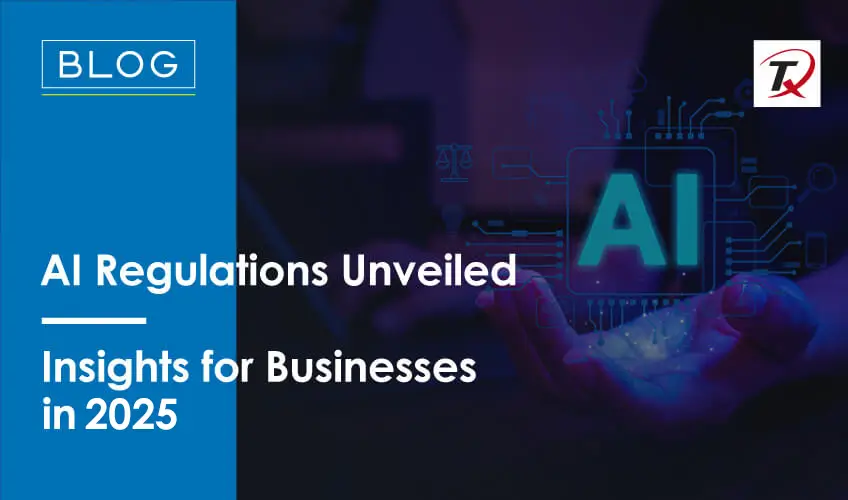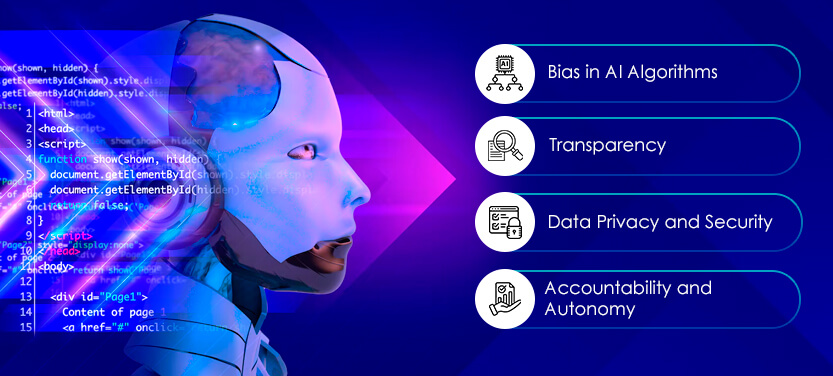Recommended Blogs
AI Regulations Unveiled: Insights for Businesses in 2025

- Recent Tech Innovations Highlighting AI Regulations Importance
- AI Regulations Around the Globe
- Key Ethical Considerations for AI Development
- Why Partner with Tx for AI Testing and Auditing Services?
- Summary
The introduction of artificial intelligence (AI) is impacting everyone’s lives faster than we can comprehend. Its rapid adoption across businesses has started an international discussion regarding AI regulations, governance, and interoperability. As it becomes an integral part of human lives, changing business sectors and facilitating innovation, it is undoubtedly transforming how we live and work. Although AI and its subset technologies are becoming popular, they raise social, moral, and legal concerns. Deep fake, data breaches, AI theft, etc., there are plenty of reasons to question this technology’s moral capabilities and security.
According to a study, 92% of organizations think they need to make more efforts to assure customers about the fair usage of their data in AI. Business leaders, from CIOs to CEOs to project managers, want to implement generative AI tools to upscale their operations while fully harnessing technology to streamline processes, improve processes, and drive efficiency. According to a survey, around 77% of US executives believe that AI will greatly impact their businesses in the next three to five years compared to other emerging technologies. So, how can businesses stay ahead in an AI environment while assuring its integrity, security, and fairness? The answer lies in the AI regulations.
Recent Tech Innovations Highlighting AI Regulations Importance
Generative AI, one of the greatest innovations in artificial technology based on ML algorithms and capable of creating new and original content in text, audio, or video, became available for public usage. Businesses started analyzing, understanding, and implementing OpenAI’s ChatGPT-4 and other LLMs and algorithms within their processes. Another tech innovation that came to light was the introduction of AI in autonomous vehicles. Although this innovation promises to reduce human errors on roads, it certainly has some safety and liability standard challenges. Furthermore, AI-driven biometric and face recognition systems are increasingly used in security and personal verification processes. However, they also raise the privacy risks that could promote the misuse of personal data.
One cannot deny that AI is a dual-edged sword. Although it offers substantial benefits, it can harm individuals or businesses in various ways. This is why governments are focusing on strictly regulating the usage of AI and its sub-applications. Concerns such as user protection, fair business practices, civil liberties, safe virtual space, intellectual property rights, etc., clearly explain why governments might be interested in AI.
The US government is working at every virtual level to implement new regulatory protections, frameworks, and policies to cultivate secure AI development and prevent societal harm. The European Union’s Artificial Intelligence Act governs AI development, deployment, and implementation. Its main objective is to require developers who work or create AI applications to test their systems for associated risks. They must document usage and mitigate risks by taking appropriate actions. Chinese Cyberspace Administration is asking for public opinion on proposed Administrative Measures for generative AI services to regulate services offered to mainland China’s residents. The Canadian Parliament has already debated AI and the Data Act. It is a legislative proposal to seamlessly implement AI laws across the Canadian territories to mitigate AI risks and promote transparency.
AI Regulations Around the Globe

Governments worldwide have worked on drafting and passing laws specific to AI technology. As we approach mid-2024, businesses should expect broader and sector-specific AI regulations to impact all industries using AI technologies. Let’s take a look at some of the new AI regulations around the globe:
United States of America:
In October 2023, the Biden administration issued an AI executive order asking US government departments and agencies to analyze and make a report on the safety and security of AI technology and its sub-applications. It must also include associated risks and AI adoption implementation procedures and processes. The US government has also established multiple sector-specific AI-related bodies to address the evolving challenges associated with AI. For example, the FTC (Federal Trade Commission) focuses on consumer protection issues in AI-based applications and asks for fair and transparent business practices. Similarly, the NHTSA regulates the safety aspects of AI-enabled technologies, such as autonomous cars powered by AI. Then there’s CCPA, which implemented strict requirements for AI usage in business practices that involve consumer data.
European Union:
The EU AI Act and the Artificial Intelligence Liability Directive (AILD) are some rules the European Union sets for using AI. On December 8, 2023, EU policymakers reached a conclusion for the EU AI Act. The act will be made mandatory two years after its introduction, with some expectations for specific provisions. The EU is also changing its Product Liability Directive and adopting a new AILD to promote civil liability for AI among EU member states. Driven by measures like GDPR and the AI Act, the EU is adopting a proactive approach to AI legislation. AI systems collect and utilize data from multiple sources; thus, strict rules must be implemented to ensure individual privacy. The AI Act supports GDPR and intends to give EU members significant control over AI development, deployment, use, and regulations. Using these acts and principles, one can see that the EU is trying to become the global leader in regulating ethical standards and promoting competitiveness and innovation in AI deployment.
United Kingdom:
In comparison, the UK follows a sector-based and scalable approach to AI regulation (a statement released in its 2023 whitepaper). The UK government undertook feedback and consultations from AI industry leaders to construct its AI practices regulations. Businesses expect to receive high-level guidance and a regulatory roadmap containing sector-based regulators. The regulators will offer customized recommendations for the competition, healthcare, banking, financial, and employment sectors. The UK government will assess whether it is necessary to implement specific AI regulations or assign an AI regulator to inform businesses about the practices of implementing AI systems in their operations.
Canada:
Canada is taking a proactive approach to crafting and implementing AI regulations, balancing supporting innovation and facilitating societal interests and ethical standards. The Canadian Administration has launched various govt.-led programs, such as the Canadian AI Ethics Council and the Pan-Canadian AI Strategy, to highlight the responsibilities of developing AI solutions and addressing any legal or ethical issues that may arise in the AI industry. It plays a key role in assisting the stakeholders in collaborating to advance technology and develop policies that align with ethical values. The Canadian government has also drafted the Personal Information Protection and Electronic Documents Act to monitor the collection, transfer, usage, and disclosure of personal information using AI solutions. This Act covers the individual’s privacy rights and ensures they are preserved and that AI solutions meet strict data protection standards.
AI regulators vary from country to country, so cooperation among international organizations and countries is pivotal. Integrating regulatory compliances and utilizing AI for a good social cause is only possible through seamless communication and collaboration.
Key Ethical Considerations for AI Development

Below is the list of some ethical considerations when engaging with AI development to ensure the seamless integration of this innovative solution within the business processes:
Bias in AI Algorithms:
AI systems can unknowingly perpetuate and promote social inequalities if not carefully monitored. Developers and the businesses that fund them must use diverse datasets and robust testing methodologies to mitigate bias issues and ensure fairness across all user groups.
Transparency:
Understanding AI’s decision-making process is important to ensure trust and accountability. For sectors such as healthcare, finance, and banking, where decision-making is at the core, having clear documentation and communication about AI systems’ usage is crucial.
Data Privacy and Security:
As AI systems process a huge amount of data, businesses need to ensure stringent measures are in place to protect individual’s personal data and prevent its misuse. Advanced security protocols and regulatory compliances are important to protect user data.
Accountability and Autonomy:
AI systems are gaining more autonomy in decision-making, making implementing explicit accountability guidelines necessary. It will ensure that any damage or security incident arising from AI decisions can be addressed promptly and responsibly.
Why Partner with Tx for AI Testing and Auditing Services?
In the rapidly transforming AI landscape, ensuring AI implementation’s integrity, security, and reliability is a critical business challenge. Partnering with Tx will offer your business a robust solution to ensure secure and responsible AI integration. We follow the latest AI regulatory and ethical standards to ensure your business complies with every international and regional AI regulation. Here’s why you should partner with Tx:
• We bring years of experience in implementing AI in testing, conducting AI testing, and testing AI-based systems.
• Our team has highly certified security professionals who understand the complexities of AI security, from data integrity to threat mitigation. We ensure your AI deployments are protected from every security threat.
• We utilize our in-house accelerators, Tx-SmarTest, Tx-PEARS, Tx-HyperAutomate, etc., to ensure every aspect is tested and evaluated before being pushed into production.
• We always stay up to date on the latest AI regulations and ensure all your implementations comply with global AI standards.
• We recognize that each business has its own requirements. We provide customized AI auditing and security solutions to align with your business-specific requirements and ensure optimal functionality and performance.
Summary
The rapid integration of AI across industries has catalyzed an international dialogue on necessary regulations to address ethical, social, and legal concerns, such as bias, data privacy, and misuse of technology. As AI shapes future business operations, governments worldwide are drafting regulations to ensure safe, fair, and secure AI usage. Regulatory frameworks like the AI Act are being developed from the US to the EU to align AI advancements with societal values and business ethics. Partnering with companies like Tx, which adhere to these regulations, can help businesses navigate this evolving landscape securely and responsibly.
Contact our experts to find out how Tx can help with AI implementation.
Discover more
Stay Updated
Subscribe for more info
